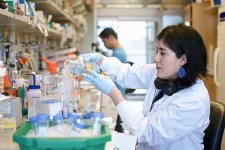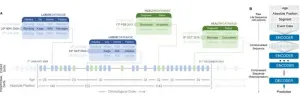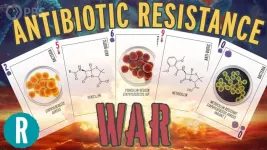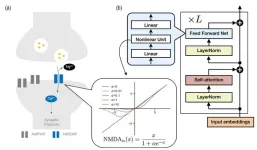(Press-News.org) A new study answers a timely question: What is the hardest part of waiting? Consumers do plenty of it—online, in line, in traffic, or for deliveries. And now we know it’s the final phase that’s most problematic for them.
In this season of joyful—and not-so-joyful—anticipation, the research has deep implications for marketers and psychological insights for us all, says Annabelle Roberts, coauthor and assistant professor of marketing at the University of Texas McCombs School of Business. The paper shows:
It’s better for companies to communicate possible delays early in the wait;
It’s better for them to overestimate the waiting period than to underestimate it;
A less negative experience of waiting can lead to a more positive evaluation of a service.
Across six studies by Roberts and colleagues found subjects felt the highest levels of impatience as the end of the waiting period approached — regardless of how long they had already been waiting. Each study measured consumer reactions to waiting on real-world events, from 2020 election results or a first short of a COVID-19 vaccine to the arrival of a bus or a package.
The underlying cause, the studies found, was people’s desire for closure. As a wait is about to end, desire gets stronger, and so does impatience.
Roberts’ paper, co-authored with Ayelet Fishbach of the University of Chicago, was just published in Social Psychological and Personality Science.
Please write judie.kinonen@mccombs.utexas.edu to set up an interview with Annabelle Roberts.
END
Feelings of impatience evolve over time, study says
New research explores the intensity of impatient emotion around different points of the waiting period, of interest to marketers and consumers alike.
2023-12-18
ELSE PRESS RELEASES FROM THIS DATE:
Little bacterium may make big impact on rare-earth processing
2023-12-18
ITHACA, N.Y. - A tiny, hard-working bacterium – which weighs one-trillionth of a gram – may soon have a large influence on processing rare earth elements in an eco-friendly way.
In a new study, Cornell University scientists show that genetically engineering this bacterium could improve the efficiency for the purification of elements found in smartphones, computers, electric cars and wind turbines, and could even boost global economic supply chains.
Vibrio natriegens, the bacterium, offers a sustainable ...
AI generates proteins with exceptional binding strengths
2023-12-18
A new study Dec. 18 in Nature reports an AI-driven advance in biotechnology with implications for drug development, disease detection, and environmental monitoring. Scientists at the Institute for Protein Design at the University of Washington School of Medicine used software to create protein molecules that bind with exceptionally high affinity and specificity to a variety of challenging biomarkers, including human hormones. Notably, the scientists achieved the highest interaction strength ever reported between a computer-generated biomolecule and its target.
Senior author David Baker, professor of biochemistry at UW Medicine, ...
Artificial intelligence can predict events in people's lives
2023-12-18
Artificial intelligence developed to model written language can be utilized to predict events in people's lives. A research project from DTU, University of Copenhagen, ITU, and Northeastern University in the US shows that if you use large amounts of data about people's lives and train so-called 'transformer models', which (like ChatGPT) are used to process language, they can systematically organize the data and predict what will happen in a person's life and even estimate the time of death.
In a new scientific article, 'Using Sequences of Life-events to Predict Human Lives', published ...
Einstein receives $10.9 million grant to validate remote cognitive testing for Alzheimer’s and other dementias
2023-12-18
December 18, 2023—(BRONX NY)—Neurologists often diagnose Alzheimer’s disease after evaluating patients during lengthy, in-person office visits. This poses a significant challenge for many groups, particularly people with limited access to specialized care, including people from historically marginalized groups and people living in rural areas.
Albert Einstein College of Medicine has received a five-year, $10.9 million grant from the National Institutes of Health (NIH) to study whether remote neuropsychological testing can substitute for in-person office visits when assessing whether people have Alzheimer’s disease or other dementias.
“In-person ...
The antibiotic resistance war (video)
2023-12-18
WASHINGTON, Dec. 18, 2023 — There’s a microscopic battle happening right before our eyes, involving the critical issue of antibiotic resistance. Witness the historical development of antibiotics, from penicillin's accidental discovery to the ongoing battle against superbugs. https://www.youtube.com/watch?v=OCR5wFWSGlA
Reactions is a video series produced by the American Chemical Society and PBS Digital Studios. Subscribe to Reactions at http://bit.ly/ACSReactions and follow us on Twitter @ACSReactions.
The American Chemical Society (ACS) is ...
AI's memory-forming mechanism found to be strikingly similar to that of the brain
2023-12-18
An interdisciplinary team consisting of researchers from the Center for Cognition and Sociality and the Data Science Group within the Institute for Basic Science (IBS) revealed a striking similarity between the memory processing of artificial intelligence (AI) models and the hippocampus of the human brain. This new finding provides a novel perspective on memory consolidation, which is a process that transforms short-term memories into long-term ones, in AI systems.
In the race towards developing ...
15th annual horizon scan identifies 15 most pressing issues for conservation, including invertebrate decline and changing marine ecosystems
2023-12-18
Since 2009, the Cambridge Conservation Initiative has coordinated an annual horizon scan, a well-established method for predicting which threats, changes, and technologies will have the biggest impact on biological conservation in the following year. This year, the 15th horizon scan included 31 scientists, practitioners, and policymakers who developed a list of 96 issues, which they eventually narrowed down to the fifteen most novel and impactful. Their findings, publishing in the journal Trends in Evolution & Ecology ...
Toothbrushing tied to lower rates of pneumonia among hospitalized patients
2023-12-18
Toothbrushing also associated with lower rates of ICU mortality, shorter duration of mechanical ventilation, and shorter ICU length of stay
Researchers say toothbrushing could be a cheap but effective way to help lower rates of hospital-acquired pneumonia
Researchers have found an inexpensive tool that may help reduce rates of pneumonia for hospitalized patients—and it comes with bristles on one end. A new study by investigators from Brigham and Women’s Hospital, a founding member of the Mass General Brigham healthcare system, and Harvard Pilgrim Health Care Institute ...
Ecosystem benefits to humanity expected to decline by 9% by 2100
2023-12-18
As climate change redistributes terrestrial ecosystems across the globe, the world’s natural capital is expected to decrease, causing a 9% loss of ecosystem services by 2100. That’s according to a study of natural capital published today in the journal Nature led by scientists at the University of California, Davis, and Scripps Institution of Oceanography at UC San Diego.
Breathable air, clean water, healthy forests and biodiversity all contribute to people’s well-being in ways that ...
Public benefit programs and differential associations with child maltreatment by race and ethnicity
2023-12-18
About The Study: The results of this study raise concerns that benefit programs may add relative advantages for white children compared with Black and Hispanic children and contribute to racial and ethnic disparities in child protective services investigations. States’ eligibility criteria and distribution practices should be examined to promote equitable effects on adverse child outcomes.
Authors: Henry T. Puls, M.D., of Children’s Mercy Kansas City, is the corresponding author.
To access the embargoed study: Visit our For The Media website ...
LAST 30 PRESS RELEASES:
Paleontologist Stephen Chester and colleagues reveal new clues about early primate evolution
UF research finds a gentler way to treat aggressive gum disease
Strong alcohol policy could reduce cancer in Canada
Air pollution from wildfires linked to higher rate of stroke
Tiny flows, big insights: microfluidics system boosts super-resolution microscopy
Pennington Biomedical researcher publishes editorial in leading American Heart Association journal
New tool reveals the secrets of HIV-infected cells
HMH scientists calculate breathing-brain wave rhythms in deepest sleep
Electron microscopy shows ‘mouse bite’ defects in semiconductors
Ochsner Children's CEO joins Make-A-Wish Board
Research spotlight: Exploring the neural basis of visual imagination
Wildlife imaging shows that AI models aren’t as smart as we think
Prolonged drought linked to instability in key nitrogen-cycling microbes in Connecticut salt marsh
Self-cleaning fuel cells? Researchers reveal steam-powered fix for ‘sulfur poisoning’
Bacteria found in mouth and gut may help protect against severe peanut allergic reactions
Ultra-processed foods in preschool years associated with behavioural difficulties in childhood
A fanged frog long thought to be one species is revealing itself to be several
Weill Cornell Medicine selected for Prostate Cancer Foundation Challenge Award
Largest high-precision 3D facial database built in China, enabling more lifelike digital humans
SwRI upgrades facilities to expand subsurface safety valve testing to new application
Iron deficiency blocks the growth of young pancreatic cells
Selective forest thinning in the eastern Cascades supports both snowpack and wildfire resilience
A sea of light: HETDEX astronomers reveal hidden structures in the young universe
Some young gamers may be at higher risk of mental health problems, but family and school support can help
Reduce rust by dumping your wok twice, and other kitchen tips
High-fat diet accelerates breast cancer tumor growth and invasion
Leveraging AI models, neuroscientists parse canary songs to better understand human speech
Ultraprocessed food consumption and behavioral outcomes in Canadian children
The ISSCR honors Dr. Kyle M. Loh with the 2026 Early Career Impact Award for Transformative Advances in Stem Cell Biology
The ISSCR honors Alexander Meissner with the 2026 ISSCR Momentum Award for exceptional work in developmental and stem cell epigenetics
[Press-News.org] Feelings of impatience evolve over time, study saysNew research explores the intensity of impatient emotion around different points of the waiting period, of interest to marketers and consumers alike.






